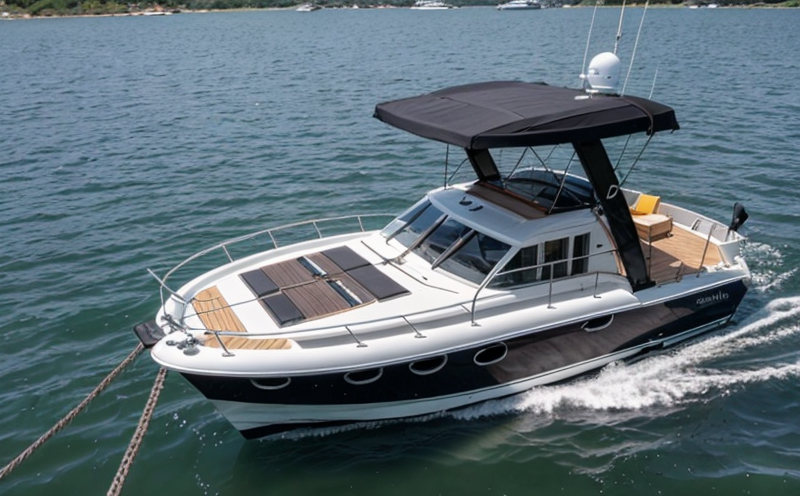ISO 6482 Stability Testing of Marine Cranes
The International Organization for Standardization (ISO) has established ISO 6482:2015, which specifies the methodology for determining the stability characteristics of marine cranes. This standard is crucial in ensuring that marine cranes meet safety, performance, and reliability requirements across various maritime environments.
The stability testing under ISO 6482 ensures that a marine crane can maintain its equilibrium while lifting heavy loads or operating in harsh weather conditions. The test involves simulating real-world scenarios where the crane might encounter extreme stress, such as during heavy seas or high winds. This process helps identify potential weaknesses and areas for improvement before any incidents occur.
The testing procedure outlined in ISO 6482 requires precise calibration of equipment to ensure accurate results. Specimens used in this test are representative marine cranes that undergo a series of maneuvers designed to challenge their stability limits. These maneuvers include static load tests, dynamic load tests, and environmental condition simulations like wind resistance.
Instrumentation plays a vital role in measuring the crane's performance during these tests. Sensors attached to both the crane structure and the load being lifted provide real-time data on movements, forces exerted, and stability angles. This information is critical for evaluating whether the crane meets the specified criteria for stability as per ISO 6482.
After completing all tests according to ISO 6482, detailed reports are generated which summarize findings from each phase of testing. These reports include graphical representations of collected data, descriptions of observed behaviors under different conditions, and recommendations for modifications if necessary. Compliance with ISO 6482 not only enhances safety but also contributes significantly towards maintaining maritime operations at optimal levels.
Understanding the importance of proper stability testing according to ISO 6482 is essential for quality managers, compliance officers, R&D engineers, and procurement teams involved in marine engineering projects. By adhering strictly to this standard, stakeholders can ensure that they are meeting international best practices while safeguarding against accidents caused by unstable cranes.
In summary, ISO 6482 stability testing ensures the safety and reliability of marine cranes by simulating real-world operational conditions through precise instrumentation. This process helps manufacturers identify potential issues early on, ensuring safer operations within challenging maritime environments.
Eurolab Advantages
EuroLab offers unparalleled expertise in marine equipment testing services, including ISO 6482 stability testing of marine cranes. Our team comprises highly skilled professionals who understand the unique challenges faced by industries operating on water. By leveraging state-of-the-art facilities and advanced technology, we provide accurate, reliable results that meet or exceed international standards.
Our commitment to quality extends beyond just meeting regulatory requirements; it also includes providing comprehensive support throughout every stage of your project. From initial consultation through final report delivery, our dedicated staff ensures seamless communication and efficient service delivery. Whether you need assistance with specimen preparation, data interpretation, or compliance advice, EuroLab is here to help.
With years of experience in this field, we bring a wealth of knowledge and practical insights that can significantly benefit your organization. Partnering with us means accessing cutting-edge methodologies and best practices designed specifically for the marine sector. This collaboration ensures that you receive top-notch service tailored precisely to your needs.
Environmental and Sustainability Contributions
The environmental impact of maritime activities cannot be overlooked, especially when considering large-scale operations like those involving marine cranes used in port facilities or offshore installations. Ensuring that these critical pieces of equipment operate safely and efficiently contributes positively to overall sustainability efforts.
EuroLab’s ISO 6482 stability testing helps minimize risks associated with accidents caused by unstable cranes, reducing the likelihood of oil spills or other environmental hazards. By identifying potential weak points early on, we enable manufacturers to implement corrective measures that enhance both safety and durability. This proactive approach supports long-term sustainability goals within the industry.
Furthermore, adhering strictly to international standards such as ISO 6482 promotes responsible business practices among companies operating in the marine sector. It encourages continuous improvement by fostering a culture of innovation and excellence. As a result, EuroLab’s services contribute not only to immediate safety improvements but also to broader sustainability initiatives aimed at protecting our oceans and coastal ecosystems.
Use Cases and Application Examples
Safety assessment for new marine crane designs before commercial release.
Compliance checks required by regulatory bodies or insurance companies.
Evaluation of existing cranes after modifications or repairs to ensure they still meet safety standards.
Demonstration of a manufacturer’s commitment to quality and adherence to international best practices for potential clients.





